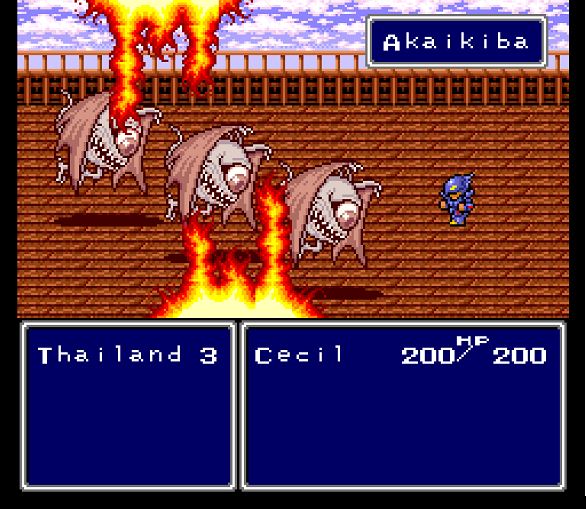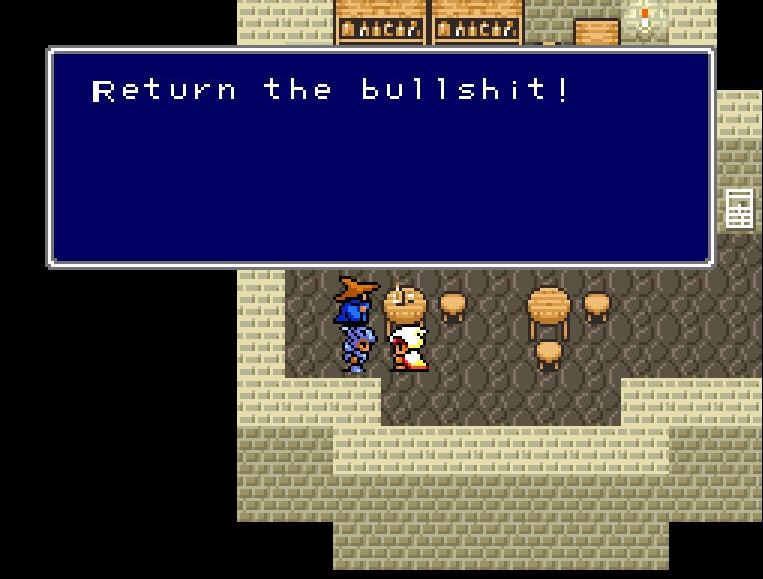Translating a game from one language to another is a nuanced process, involving specialists who carefully parse how words convey meaning, tone, and emotion. It’s not as simple as taking the text, dumping it into Google Translate, and seeing what the software spits out. If you did that, as translator Clyde Mandelin has been doing recently with Final Fantasy IV, you might end up with a character shouting “The enema is saying that you should not wear a basketball!”
Mandelin, best known for leading the team of fans who expertly translated Nintendo’s Mother 3, is constantly looking for ways to play with language. He became interested in translations halfway through college. After years of studying computer science, he got bored, and started to wonder what was next. While browsing the web for a video game fan translation group, he stumbled upon a request for help that’d put his five semesters of studying Japanese to use.
Videos by VICE
The project, whose translation was beyond his skills at the time, was exciting enough to give him the direction he was looking for. For the past 15 years, he’s been a professional translator.
“Translating entertainment is gratifying in many ways,” he said. “It’s naturally entertaining, there are always new, weird challenges, and there’s a great feeling of accomplishment when friends, family, and others can enjoy something that they never would’ve experienced without your hard work. Similarly, I enjoy explaining the translation and localization process in tangible ways that others can easily understand, hence projects like this Final Fantasy IV machine translation experiment, which I’ve nicknamed Funky Fantasy IV.”
He picked Final Fantasy IV, released in the US as Final Fantasy II, for a reason.
“I thought Final Fantasy IV would make a good testbed for showcasing multiple types of localization styles,” he told me, “such as hyper-literal and hyper-liberal, as well as showing how localizations change and under different conditions, such as extreme memory limitations and large team/crowdsource situations. Basically, this machine translation project is only one small part in a larger set of experiments I’d like to try.”
(It’s also worth looking into this game’s specific history with localization, which involved a Nintendo-driven policy of removing references to religion, including prayer, out of games.)
Hyper-literal translations involve words and phrases directly moving from one language to the other, without much consideration over whether it’ll make contextual sense on the other side. Hyper-liberal, on the other hand, has the localizer ensuring that intent translates as well.
“If a character eats onigiri or curry or dorayaki,” said translator Alan Averill recently on Twitter, “the developer might be trying to convey more than just ‘This is food, eat it.’ Maybe curry is fine. Or maybe it’s from Mom and meant to be comforting, in which case something like PB&J might actually be more appropriate.”
In a hyper-literal translation, curry wouldn’t become PB&J, it would remain curry.
What Mandelin is doing with Final Fantasy IV riffs on the idea of a hyper-literal translation; he simply rams the script for the Japanese version of the game into Google Translate.
“I’ve always been a huge fan of the game since it was first released in English,” he said. “I’ve even spent years documenting its various localizations in great detail. While digging into these localizations, I often wondered how a machine-translated version of the game would compare against them, especially now that machine translation has improved in the last decade.”
“I enjoy explaining the translation and localization process in tangible ways that others can easily understand, hence projects like this Final Fantasy IV machine translation experiment, which I’ve nicknamed Funky Fantasy IV.”
Mandelin built a custom tool that rips the text from the Japanese version of Final Fantasy IV, removing unnecessary data and formatting, to ensure Google can do its job. The tool takes what Google spits out, and drops it back into the game. He streams the results on Twitch.
“The natural assumption I had beforehand was that the machine translation would do very poorly,” he said. “Japanese to English translation is especially difficult for machines to translate, but I wanted to set aside those assumptions for this project.”
What Mandelin found was that Google was remarkably good at handling item descriptions and battle dialogue, which tends to be clear, precise, and specific. Story sequences are longer, more complicated, and typically use implications that a machine, at this stage, isn’t good at picking up.
It also got hung up on what Mandelin calls “entertainment speech,” a riff on Japanese language different from ordinary, proper Japanese. It’s not surprising the tool is built for the latter, resulting in moments where Google wouldn’t bother translating a word at all.
Here’s an example of the machine translation doing a good job:
Final Fantasy IV images courtesy of Clyde Mandelin
And here’s an example of the translation going off the rails:

“‘Float-Eyeball’ monsters became ‘Flow Thailand Balls,’” he said, “and then just ‘Thailand’ after my program automatically shortened the name to fit into the text window.”
Machine translations aren’t common for localizing video games, and the errors above help show why, but it definitely happens. In fact, with more and more video game being released these days, some developers just can’t afford what it costs to get a game properly translated.
To illustrate, Mandelin passed on some examples that, at least, suggest a machine translation. Here’s an excerpt from Alice in the Heart: Wonderful Wonder World, a mobile otome game.

(Otome is a romance game aimed at women.)
“The result is about on par with my Final Fantasy IV machine translation, now that I think about it,” he said.
You get what you pay for. For now, at least. Machine translation has already come a long way. Mandelin has already played several hours of his machine-translated version of Final Fantasy IV, and you can continue to follow his adventures on Twitch.
More
From VICE
-

Photo: NATALIA ANDREEVA / Getty Images -

(Photo by John Nacion/Variety via Getty Images) -

Illustration by Reesa -

(Photo by Prince Williams/WireImage)
